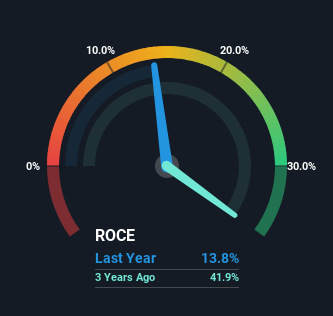- China
- /
- Other Utilities
- /
- SHSE:605580
Hengsheng Energy (SHSE:605580) Will Want To Turn Around Its Return Trends
What trends should we look for it we want to identify stocks that can multiply in value over the long term? One common approach is to try and find a company with returns on capital employed (ROCE) that are increasing, in conjunction with a growing amount of capital employed. Ultimately, this demonstrates that it's a business that is reinvesting profits at increasing rates of return. Having said that, from a first glance at Hengsheng Energy (SHSE:605580) we aren't jumping out of our chairs at how returns are trending, but let's have a deeper look.
Return On Capital Employed (ROCE): What Is It?
If you haven't worked with ROCE before, it measures the 'return' (pre-tax profit) a company generates from capital employed in its business. Analysts use this formula to calculate it for Hengsheng Energy:
Return on Capital Employed = Earnings Before Interest and Tax (EBIT) ÷ (Total Assets - Current Liabilities)
0.14 = CN¥152m ÷ (CN¥1.5b - CN¥408m) (Based on the trailing twelve months to March 2024).
Therefore, Hengsheng Energy has an ROCE of 14%. In absolute terms, that's a satisfactory return, but compared to the Integrated Utilities industry average of 5.1% it's much better.
Check out our latest analysis for Hengsheng Energy

While the past is not representative of the future, it can be helpful to know how a company has performed historically, which is why we have this chart above. If you'd like to look at how Hengsheng Energy has performed in the past in other metrics, you can view this free graph of Hengsheng Energy's past earnings, revenue and cash flow.
What Does the ROCE Trend For Hengsheng Energy Tell Us?
On the surface, the trend of ROCE at Hengsheng Energy doesn't inspire confidence. To be more specific, ROCE has fallen from 41% over the last five years. And considering revenue has dropped while employing more capital, we'd be cautious. This could mean that the business is losing its competitive advantage or market share, because while more money is being put into ventures, it's actually producing a lower return - "less bang for their buck" per se.
On a related note, Hengsheng Energy has decreased its current liabilities to 27% of total assets. That could partly explain why the ROCE has dropped. What's more, this can reduce some aspects of risk to the business because now the company's suppliers or short-term creditors are funding less of its operations. Some would claim this reduces the business' efficiency at generating ROCE since it is now funding more of the operations with its own money.
In Conclusion...
From the above analysis, we find it rather worrisome that returns on capital and sales for Hengsheng Energy have fallen, meanwhile the business is employing more capital than it was five years ago. It should come as no surprise then that the stock has fallen 25% over the last year, so it looks like investors are recognizing these changes. That being the case, unless the underlying trends revert to a more positive trajectory, we'd consider looking elsewhere.
Since virtually every company faces some risks, it's worth knowing what they are, and we've spotted 2 warning signs for Hengsheng Energy (of which 1 is a bit concerning!) that you should know about.
For those who like to invest in solid companies, check out this free list of companies with solid balance sheets and high returns on equity.
Valuation is complex, but we're here to simplify it.
Discover if Hengsheng Energy might be undervalued or overvalued with our detailed analysis, featuring fair value estimates, potential risks, dividends, insider trades, and its financial condition.
Access Free AnalysisHave feedback on this article? Concerned about the content? Get in touch with us directly. Alternatively, email editorial-team (at) simplywallst.com.
This article by Simply Wall St is general in nature. We provide commentary based on historical data and analyst forecasts only using an unbiased methodology and our articles are not intended to be financial advice. It does not constitute a recommendation to buy or sell any stock, and does not take account of your objectives, or your financial situation. We aim to bring you long-term focused analysis driven by fundamental data. Note that our analysis may not factor in the latest price-sensitive company announcements or qualitative material. Simply Wall St has no position in any stocks mentioned.
About SHSE:605580
Proven track record with adequate balance sheet.
Market Insights
Community Narratives




